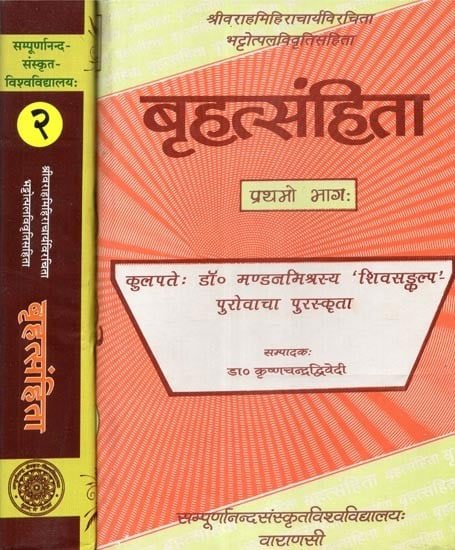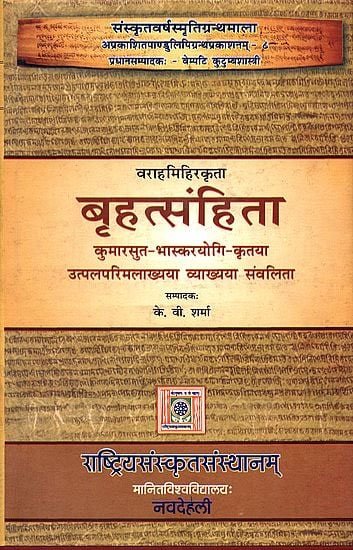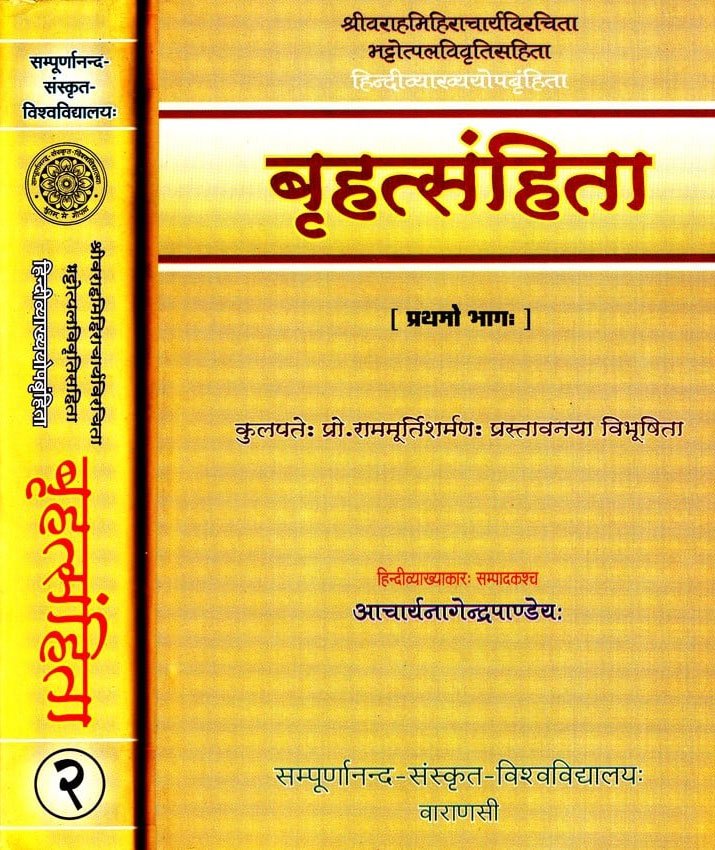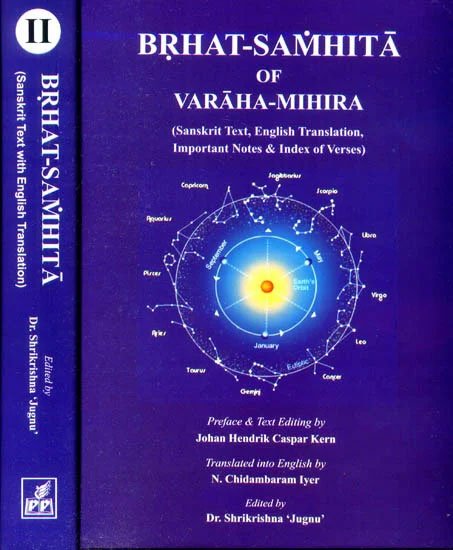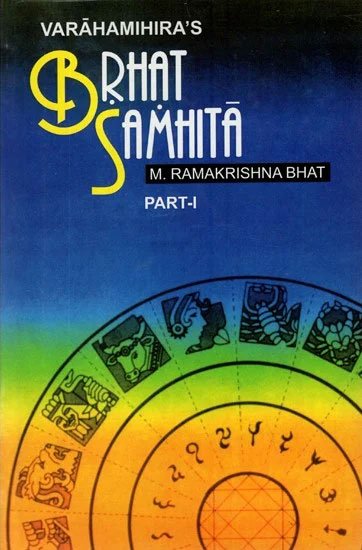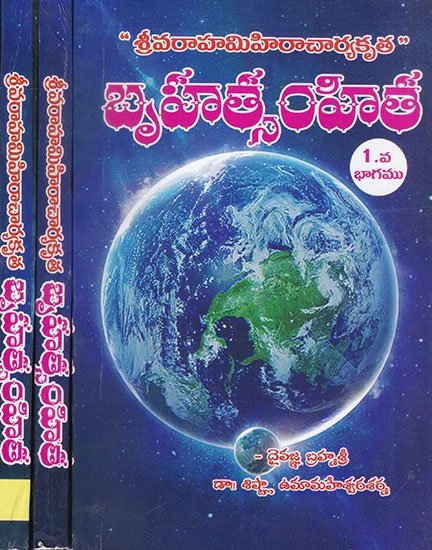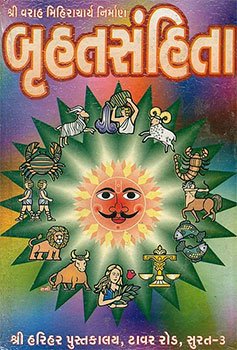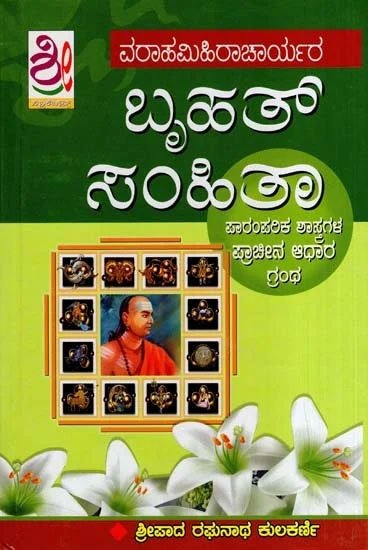Brihat-samhita [sanskrit]
26,560 words
The Sanskrit text of the Brihat-samhita from the 6th-century authored by Varaha Mihira in present-day Ujjain, India. It primarily deals with astrology and astronomy but is presented as an encyclopedia of knowledge.
Verse 51.6
धनाप्तिं सौभाग्यं शुचमपि कराङ्गुल्युदरगाः सुपानान्नं नाभौ तदध इह चौरैर्धनहृतिम् ।
धनं धान्यं बस्तौ युवतिमथ मेढ्रे सुतनयान्धनं सौभाग्यं वा गुदवृषणजाता विदधति ॥ ६ ॥
dhanāptiṃ saubhāgyaṃ śucamapi karāṅgulyudaragāḥ supānānnaṃ nābhau tadadha iha caurairdhanahṛtim |
dhanaṃ dhānyaṃ bastau yuvatimatha meḍhre sutanayāndhanaṃ saubhāgyaṃ vā gudavṛṣaṇajātā vidadhati || 6 ||
The Sanskrit text of Verse 51.6 is contained in the book Brihata Samhita (Sanskrit Text with Hindi Translation) by Pandit Achyutananda Jha. This book is available online or you could buy the latest edition:
Read online Buy now! The Sanskrit text by Pandit Achyutananda Jha (2001)
Glossary of Sanskrit terms
Note: This extracts Sanskrit terms and links to English definitions from the glossary, based on an experimental segmentation of verse (51.6). Some terms could be superfluous while some might not be mentioned. Click on the word to show English definitions.
Dhanapti, Saubhagya, Shuc, Shuca, Api, Karanguli, Udara, Supananna, Nabh, Nabha, Nabhi, Tada, Dha, Iha, Caura, Dhanahrit, Dhana, Dhanya, Basta, Basti, Yuvati, Atha, Medhra, Sutanaya, Var, Guda, Vrishana, Jata,
Analysis of Sanskrit grammar
Note: this is an experimental feature and only shows the first possible analysis of the Sanskrit text (Verse 51.6). If the system was successful in segmenting the sentence, you will see of which words it is made up of, generally consisting of Nouns, Pronouns, Verbs, Participles and Indeclinables. Click on the link to show all possible derivations of the word.
- Line 1: “dhanāptiṃ saubhāgyaṃ śucamapi karāṅgulyudaragāḥ supānānnaṃ nābhau tadadha iha caurairdhanahṛtim ”
- dhanāptim -
-
dhanāpti (noun, feminine)[accusative single]
- saubhāgyam -
-
saubhāgya (noun, neuter)[adverb], [nominative single], [accusative single]saubhāgyā (noun, feminine)[adverb]
- śucam -
-
śuca (noun, masculine)[adverb], [accusative single]śuca (noun, neuter)[adverb], [nominative single], [accusative single]śucā (noun, feminine)[adverb]śuc (noun, feminine)[accusative single]śuc (noun, masculine)[accusative single]√śuc (verb class 1)[injunctive active first single]√śuc (verb class 4)[injunctive active first single]
- api -
-
api (indeclinable preposition)[indeclinable preposition]ap (noun, neuter)[locative single]
- karāṅgulyu -
-
karāṅguli (noun, feminine)[compound], [adverb], [nominative dual], [vocative dual], [accusative dual]
- udara -
-
udara (noun, neuter)[compound], [vocative single]
- gāḥ -
-
ga (noun, masculine)[nominative plural], [vocative plural]gā (noun, feminine)[nominative plural], [vocative plural], [accusative plural]go (noun, masculine)[accusative plural]√gā (verb class 2)[injunctive active second single]√gā (verb class 3)[injunctive active second single]
- supānānnam -
-
supānānna (noun, neuter)[adverb], [nominative single], [accusative single]
- nābhau -
-
nābh (noun, feminine)[nominative dual], [vocative dual], [accusative dual]nābha (noun, masculine)[nominative dual], [vocative dual], [accusative dual]nābhi (noun, feminine)[locative single]nābhi (noun, masculine)[locative single]
- tada -
-
tada (noun, masculine)[compound], [vocative single]tada (noun, neuter)[compound], [vocative single]
- dha* -
-
dha (noun, masculine)[nominative single]dhā (noun, masculine)[accusative plural], [ablative single], [genitive single]
- iha -
-
iha (indeclinable adverb)[indeclinable adverb]iha (indeclinable)[indeclinable]
- caurair -
-
caura (noun, masculine)[instrumental plural]caura (noun, neuter)[instrumental plural]
- dhanahṛt -
-
dhanahṛt (noun, masculine)[compound], [adverb], [nominative single], [vocative single]dhanahṛt (noun, neuter)[compound], [adverb], [nominative single], [vocative single], [accusative single]
- im -
-
i (noun, masculine)[accusative single]
- Line 2: “dhanaṃ dhānyaṃ bastau yuvatimatha meḍhre sutanayāndhanaṃ saubhāgyaṃ vā gudavṛṣaṇajātā vidadhati ”
- dhanam -
-
dhana (noun, masculine)[adverb], [accusative single]dhana (noun, neuter)[adverb], [nominative single], [accusative single]
- dhānyam -
-
dhānya (noun, masculine)[adverb], [accusative single]dhānya (noun, neuter)[adverb], [nominative single], [accusative single]dhānyā (noun, feminine)[adverb]
- bastau -
-
basta (noun, masculine)[nominative dual], [vocative dual], [accusative dual]basti (noun, masculine)[locative single]basti (noun, feminine)[locative single]
- yuvatim -
-
yuvati (noun, feminine)[accusative single]
- atha -
-
atha (indeclinable)[indeclinable]
- meḍhre -
-
meḍhra (noun, masculine)[locative single]meḍhra (noun, neuter)[nominative dual], [vocative dual], [accusative dual], [locative single]
- sutanayān -
-
sutanaya (noun, masculine)[accusative plural]
- dhanam -
-
dhana (noun, masculine)[adverb], [accusative single]dhana (noun, neuter)[adverb], [nominative single], [accusative single]
- saubhāgyam -
-
saubhāgya (noun, neuter)[adverb], [nominative single], [accusative single]saubhāgyā (noun, feminine)[adverb]
- vā* -
-
vār (noun, masculine)[adverb], [nominative single], [vocative single]vār (noun, neuter)[adverb], [nominative single], [vocative single], [accusative single]va (noun, masculine)[nominative plural], [vocative plural]vā (noun, feminine)[nominative plural], [vocative plural], [accusative plural]
- guda -
-
guda (noun, masculine)[compound], [vocative single]
- vṛṣaṇa -
-
vṛṣaṇa (noun, masculine)[compound], [vocative single]vṛṣaṇa (noun, neuter)[compound], [vocative single]
- jātā* -
-
jāta (noun, masculine)[nominative plural], [vocative plural]jātā (noun, feminine)[nominative plural], [vocative plural], [accusative plural]√jan -> jāta (participle, masculine)[nominative plural from √jan class 1 verb], [vocative plural from √jan class 1 verb], [nominative plural from √jan class 2 verb], [vocative plural from √jan class 2 verb], [nominative plural from √jan class 3 verb], [vocative plural from √jan class 3 verb], [nominative plural from √jan class 4 verb], [vocative plural from √jan class 4 verb]√jan -> jātā (participle, feminine)[nominative plural from √jan class 1 verb], [vocative plural from √jan class 1 verb], [accusative plural from √jan class 1 verb], [nominative plural from √jan class 2 verb], [vocative plural from √jan class 2 verb], [accusative plural from √jan class 2 verb], [nominative plural from √jan class 3 verb], [vocative plural from √jan class 3 verb], [accusative plural from √jan class 3 verb], [nominative plural from √jan class 4 verb], [vocative plural from √jan class 4 verb], [accusative plural from √jan class 4 verb]
- vi -
-
vi (indeclinable adverb)[indeclinable adverb]vi (indeclinable preposition)[indeclinable preposition]vi (noun, masculine)[compound], [adverb]vi (noun, neuter)[compound], [adverb], [nominative single], [vocative single], [accusative single]ve (noun, masculine)[adverb]vī (noun, feminine)[adverb]vī (noun, masculine)[adverb]vī (noun, neuter)[compound], [adverb], [nominative single], [vocative single], [accusative single]vi (Preverb)[Preverb]
- dadhati -
-
√dadh (verb class 1)[present active third single]√dhā (verb class 1)[present active third single]√dhā (verb class 3)[present active third plural]
Other editions:
Also see the following editions of the Sanskrit text or (alternative) English translations of the Verse 51.6
Brhatsamhita with the Commentary of Bhattotpala
by Krishna Chandra Dwivedi (2016)
Publisher: Sampurnanand Sanskrit University; 1229 pages;
Buy now!
Brihat Samhita with the Commentary of Utpalapatimala of Yogisvara
by K. V. Sharma (2012)
Publisher: Rashtriya Sanskrit Sansthan, Janakpuri; 754 pages; ISBN-10; 8186111360; ISBN-13: 9788186111369
Buy now!
Brihat Samhita (Hindi Translation)
by K. V. Sharma (2002)
Publisher: Sampurnanand Sanskrit University; 2359 pages; ISBN-13: 9789387890008.
Buy now!
Brhat Samhita (English translation)
by N. Chidambaram Iyer (2022)
Publisher: Parimal Publication Pvt. Ltd.; 801 pages; Edited by Dr. Shrikrishna Jugnu; ISBN-10: 8171104215; ISBN-13: 9788171104215.
Buy now!
Brhat Samhita (English with notes)
by M. Ramakrishna Bhat (2010)
Publisher: Motilal Banarsidas Publishers Pvt. Ltd.; 1155 pages; ISBN-10: 8120810600; ISBN-13: 9788120810600.
Buy now!
Brhat Samhita (Telugu translation)
by Sishtla Umamaheswara Sharma (2020)
Publisher: Mohan Publications, Andhra Pradesh; 846 pages.
Buy now!Preview of verse 51.6 in Kannada sript:
ಧನಾಪ್ತಿಂ ಸೌಭಾಗ್ಯಂ ಶುಚಮಪಿ ಕರಾಙ್ಗುಲ್ಯುದರಗಾಃ ಸುಪಾನಾನ್ನಂ ನಾಭೌ ತದಧ ಇಹ ಚೌರೈರ್ಧನಹೃತಿಮ್ ।
ಧನಂ ಧಾನ್ಯಂ ಬಸ್ತೌ ಯುವತಿಮಥ ಮೇಢ್ರೇ ಸುತನಯಾನ್ಧನಂ ಸೌಭಾಗ್ಯಂ ವಾ ಗುದವೃಷಣಜಾತಾ ವಿದಧತಿ ॥ ೬ ॥
Brhat Samhita (Gujarati translation)
by - (2000)
Publisher: Shree Harihar Pustakalay, Surat; Author: Shri Varahamihira Acharya (શ્રી વરાહમિહીરાચાર્ય); 432 pages.
Buy now!Preview of verse 51.6 in Gujarati sript:
ધનાપ્તિં સૌભાગ્યં શુચમપિ કરાઙ્ગુલ્યુદરગાઃ સુપાનાન્નં નાભૌ તદધ ઇહ ચૌરૈર્ધનહૃતિમ્ ।
ધનં ધાન્યં બસ્તૌ યુવતિમથ મેઢ્રે સુતનયાન્ધનં સૌભાગ્યં વા ગુદવૃષણજાતા વિદધતિ ॥ ૬ ॥
Brhat Samhita (Kannada translation)
by Sripada Raghunatha Kulkarni (2021)
Publisher: Srinidhi Publications, Bangalore; 668 pages with illustrations.
Buy now!Preview of verse 51.6 in Kannada sript:
ಧನಾಪ್ತಿಂ ಸೌಭಾಗ್ಯಂ ಶುಚಮಪಿ ಕರಾಙ್ಗುಲ್ಯುದರಗಾಃ ಸುಪಾನಾನ್ನಂ ನಾಭೌ ತದಧ ಇಹ ಚೌರೈರ್ಧನಹೃತಿಮ್ ।
ಧನಂ ಧಾನ್ಯಂ ಬಸ್ತೌ ಯುವತಿಮಥ ಮೇಢ್ರೇ ಸುತನಯಾನ್ಧನಂ ಸೌಭಾಗ್ಯಂ ವಾ ಗುದವೃಷಣಜಾತಾ ವಿದಧತಿ ॥ ೬ ॥
![Brihat-samhita [sanskrit] - book cover](/uploads/a/Brihat-Samhita-Sanskrit.jpg)
